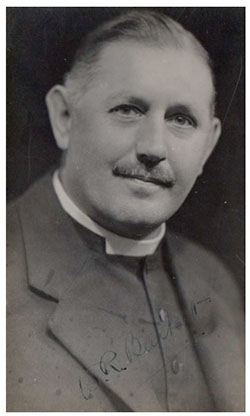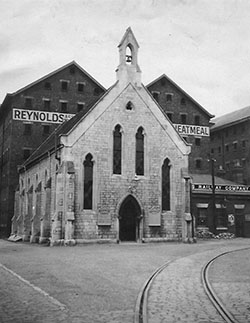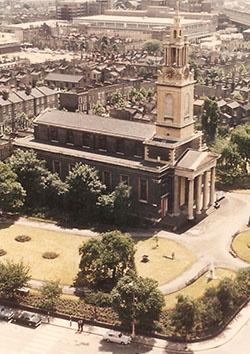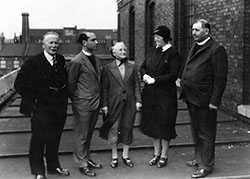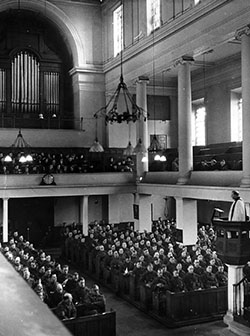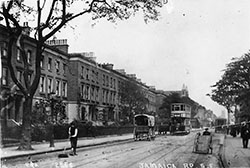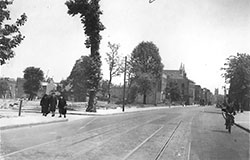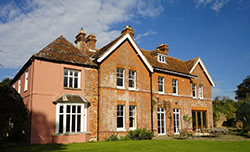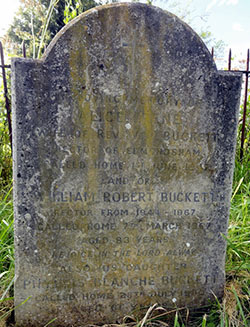The Rev. William Robert BUCKETT 1883 - 1967
Third child, second son of William BUCKETT 1852 - 1919 and Mary Anne YOUNG 1857 - 1910
Generally known as ‘Bob’ Buckett in his youth and amongst his family.
Born 20th September 1883, Sandown, Isle of Wight
Died 7th March 1967, Salisbury infirmary, Salisbury, Wiltshire
Married
1) Alice Blanche WHITMORE 1879 - 1937 on 20 April 1908
2) Alice Irene (Rene) DENLY 1902 - 1947 in April 1939
William and Alice Blanche had three children
Early Life
Bob was born and grew up at Brading, Sandown IOW. According to the 1901 census, when he was seventeen, he was a boatbuilder’s apprentice. His father aged forty nine, was listed as a bricklayer’s labourer. His older brother George at eighteen was a grocer’s assistant. The younger twin brothers were then fifteen. Albert was a Post Office boy, and Gilbert a house painter’s apprentice. Frank at seven years would be at school. Their mother Mary Anne aged forty six, would be busily keeping house, doing domestic duties. The oldest sibling Fanny Amelia (Millie) at twenty one was not at that address, the night of the census.
What made Bob leave the Isle of Wight? His direct forebears had remained on the island all their lives. Maybe better opportunities and new horizons called from the mainland?
There is a gap in our knowledge of his early adult life. It seems at some point he attended an Evangelical rally and felt a sense of calling to ministry. We know he went to live and work in London. What he did we don’t know for sure. There is a faint memory of being told he was in the construction industry. As a boatbuilder he would have had good skills in joinery and carpentry. London was busily expanding its many suburbs and skills in construction were needed.
I remember being told that he attended evening classes for Reader Training. Readers (Lay Readers) are not ordained nor paid but serve to give time to the church through the taking of non-sacramental services and preaching. He eventually became a Licensed Lay Reader in the Whitechapel area of the London East End.
During these early years he also met and married his first wife, Alice Blanche WHITMORE 1879 – 1937. They got married at St Thomas’ Lambeth in 1908. She was twenty eight and he twenty four.
Bob then went on to study for ministry at the London College of Divinity. In those days there was money from central funds in the form of bursaries to help poorer students get through college. He was duly Deaconed and Priested and was curate at Walthamstow. During these years three daughters were born to Alice and Bob.
Crockford’s
From Crockford’s Clerical Directory of 1961 - 62
1919 -
London College of Divinity
1921 -
Deaconed
1922 -
Priested (Chelmsford)
1921 - 1924
Curate of St Luke, Walthamstow
1924 - 1939
Chaplain of Mariners’ Chapel and Gloucester City General Hospital and Public Assistant Institute of Gloucester
1927 - 1939
Chaplain Gloucester Royal Infirmary
1939 - 1944
Vicar of St James, Bermondsey
1944 - 1967
Rector of Edmondsham, Diocese of Salisbury
Address: Edmondsham Rectory, Wimborne, Dorset.
(Tel: Cranborne 208)
1921 - 1924 Walthamstow
Mollie his youngest daughter used to recall that where they lived was on the very edge of the London conurbation going northeast. Their house looked out on to wooded countryside.
1924 - 1939 Gloucester
Mariners Chapel, Gloucester Docks.
Mission to Seamen
Mariners Chapel was built in 1849 to meet the needs of the Sailors and boatmen arriving at the docks. Gloucester was still an important (if somewhat inland) port. The Gloucester & Sharpness Canal was built and opened in 1827, The purpose was to by-pass a long and dangerous bend on the Severn estuary at Arlingham. The Chaplain met arriving ships and services could be held on the quayside. The Church also provided lessons in literacy and a coffee bar to combat drunkenness.
Alice, Bob’s wife had strong family connections with Gloucester, so going there to live suited her very well. It was thought that Bob would be ideally suited to the post at the Mariners’ Chapel. His Isle of Wight background and common touch meant he would be ideal for this specialist ministry.
The family lived in Brunswick Square, Gloucester. This pleasant Georgian square, with houses around three sides and with its garden in the centre, was a peaceful place away from the rough life of the docks for the daughters, Phyllis, Nancy and Mollie to grow up in.
During their time in Gloucester, Bob and Alice struck up a friendship with Dr Arthur John HUBBARD 1856-1935 and his wife Charlotte Marian VIZARD 1859-1940. How they met is now not known. The Hubbards lived some way (thirteen miles) from Gloucester at Pleasant Stile, Littledean.
Sadly in 1937 Alice, Bob’s wife, died of cancer at the age of fifty eight. The family were distraught. A nurse, Rene Denly who worked at the Gloucester City General Hospital (now the Gloucester Royal) was already a friend of the family. She was of great help during this time of grieving. She and Bob developed a deep attachment and within eighteen months they were engaged. Bob married Alice Irene DENLY 1902 - 1947 in April 1939. This was a hugely happy development for them both but not for the daughters. There was only seven years difference between oldest daughter Phyllis aged thirty that year and Rene the new happy wife, aged of thirty seven. On the surface all was calm but the daughters, even though they were now adults, suffered deep psychological scars which didn’t surface until years later. They still felt the loss of their mother and found it difficult to reconcile their beloved father was so happy with Rene.
1939 - 1944 Bermondsey
The following is extracted and adapted from ‘The History of St. James Church, Bermondsey.’ (Now out of print.) The writer of the original article not identified.
Pictures added by JFH.
St James in wartime London.
‘William Robert Buckett came to St James’ in the Spring of 1939 (Institution and Induction Service 9th June), so when war was declared on September 3rd - that fateful Sunday morning - we were already aware that in this elderly man (he was 56) we had someone who was to be a real ‘father to his flock’.’
St James Church Bermondsey with the Peak Freans biscuit factory behind.
Bermondsey is a district in Southeast London, south of the river Thames.
(Photo from family archives.)
‘In June 1939, a Curate, the Rev V.B. Wynburne, joined the staff, D.T. Chapman (aged 68) Lay Reader, Miss Hetty King, Lady Worker since 1914, and in August Sister Parker (Church Army) joined them.’
L. to R.
Mr D.T. Chapman, Lay Reader; the Rev V.B. Wynburne, Curate; Miss Hetty King,
Lady (Parish) Worker; Sister Parker, Church Army; the Rev W R Buckett, Vicar.
(Photo from family archives.)
‘Most children went with their schools to what were considered to be safer areas. Many elderly people and mothers with young children left London, but many had returned by Christmas: the time until the late summer of 1940 was called the ‘phoney war’. Life in the Parish went on much as usual - all Services as usual, and always, even when raids were at their worst, there was the 8am Holy Communion, Morning Service at 11am and Evening Service at 6.30pm (3.30 in the winter). Everyone who was at all able enrolled in Air Raid Precautions (A.R.P.) or the Fire Service.’
The Rev W.R.Buckett takes a service for the Home Guard 1941 at St James Bermondsey.
(Photo from family archives.)
‘The Vicarage, 123 Jamaica Road, became, as never before, the focal point of the parish. In December Nancy Buckett, the Vicar’s second daughter, died at a Missionary Training College at Blackheath. His eldest daughter, Phyllis, was teaching in Kettering and Mollie was evacuated to Surrey with a Nursery School where she taught. Every month a Newsletter was circulated full of news of war commitments of the congregation: the Vicar maintained a regular correspondence with the young men in the Forces and some are still in touch with us, though few now live in Bermondsey. There were also dates and times of services and meetings and every year in December a Sale of Work was announced and well supported, even when held in the Crypt. Home Guard Parades were a regular event and the Commander (A. Ritchie) wrote warmly of their appreciation of the Vicar’s thought for them. 1940 brought the Battle of Britain and enemy aircraft, using the River as guide, “strafed” the riverside boroughs. The coal cellar in the Vicarage was used as a shelter and often housed a strange assortment of people. One of the earliest was a Dutch sea captain whom Mr Buckett remembered from the days before he came to Bermondsey and worked in a Mission to Seamen in Gloucester. Apart from the casual passers-by who asked for shelter, the Vicarage provided a temporary home for Mr and Mrs Chapman when their house was bombed and also later for Miss King.
All in need were welcomed and everyone shared rations, clothes and bedding, etc. whether they were members of the church or not. In March and April 1941 Bermondsey suffered very heavy bombing. Early on a Saturday evening, 15th March, a 16 year old Guide Patrol Leader of St James’, Elsie Payne (Chick to her friends) was killed. On 6th April, John Austin, St James’ Scoutmaster, was killed on duty as an A.R.P. Warden. The Mayor, Councillor Henley, father of the present Mayor, Len Henley, was killed in the Town Hall and on 10th May another 16 year old Guide, Vera Titchener, was killed with her mother in a shelter, whilst her father, a police officer, was on duty in another part of London. Attendances at church kept up very well - 75 at Holy Communion on Christmas Day 1939, 124 at the Mothering Sunday Service in 1940. Early in 1944 the School was bombed in the night so there were no casualties and they afterwards continued to hold classes in a series of local schools with Mrs Wheeler as the temporary Head. Mrs Hatherley and her two daughters, who lived in the School House, went to live in the Vicarage. All the church windows were shattered, parts of the ceiling collapsed and the clock, after striking something like 100 times, stopped for long after peace came. Services were however another instance of ‘business as usual’ the slogan chalked up all over London. Even if the Service finished in the crypt and the raid went on all night, it always started on time, in the South Aisle. Weddings braved the dangers of the main church and guests seated in the choir stalls trod broken glass underfoot. The Vicar was an expert clearer up of bomb damage and whenever there was trouble he could be counted on to appear, broom in hand, ready to help and comfort. Then in June 1944 the first Flying Bomb to fall on SE London fell just outside 123 Jamaica Road. The Vicarage was destroyed but the coal-cellar shelter saved those in it from physical injury and they were rescued and taken to Dr Gillison’s house in Lower Road, and that became their home during daylight hours; the nights were spent in the church crypt.’
Jamaica Road before bombing. Vicarage on left with tree in front.
Jamaica Road after bombing. Tree still there, minus branches.
(Photo from family archives.)
‘The Vicar organised a working party to make bunks and doors and install essential light and fittings so that about 24 of the 40 arches in the crypt became inhabited by a considerable number of the congregation who gathered there each night bringing their food and flasks of drinks. The time passed pleasantly with a real community spirit. Mrs Buckett made plum jam on an oil stove; we helped sort and tidy the Vicarage books and belongings. I remember being the only person able to go out with the Vicar to see where near-sounding bombs had fallen, so that if needed we might help. Always the evening finished with the prayer “Lighten our darkness we beseech Thee O Lord”. At this time the only ‘break’ the Vicar managed to take was a stroll on a quiet afternoon to Cherry Garden Pier. He enjoyed a chat with the Pier Master and the waterside workers, and there were one or two short trips on the river. The River was a breathing space for several of us: my mother often said on a hot afternoon “Lets go on the tram to Greenwich and enjoy a breeze on the pier”. Like the Vicar, we found the River certainly helped us to ‘keep cool’ in more ways than one! In November 1944, Mr Buckett was offered a Living in Dorset, a small parish of Edmondsham, near Salisbury. His wife was still suffering from the effects of the bombing; the end of the war seemed in sight and he felt that St James’ in peace time would need a younger man to gather together the battered life of the parish. He believed that younger men would be available, and so he left us and at St James’ only Mr Chapman and Miss King remained. The Curate had become the Vicar of a church in Yarmouth in September 1940 and Sister Parker had accepted another post.
Mollie Buckett stayed on with the Hatherley sisters in St James’ Road and continued teaching in London. After three years in Edmondsham, Mrs Alice (Rene) Buckett died and Phyllis came home to the Rectory where she helped in the Parish and cared for her father until his death on 7th March, 1967.
After the war many Bermondsey people spent holidays at Edmondsham and three or four times a year Mr Buckett visited his friends in Bermondsey, and when the church was re-opened, in the South Aisle, on 30th January, 1966, he read the Lesson at the Memorial Service there for the Rev G.R. Balleine (former Rector). “That portion of a good man’s life, His little nameless, unremembered acts, of kindness and of love.” (Wordsworth)’
1944 - 1967 Edmondsham, Dorset
Edmondsham Church (Photo JFH)
The parish of Edmondsham was the complete opposite to the London scene. A small feudal hamlet, complete with Edmondsham House, a picturesque Tudor manor, set in the depths of glorious Dorset countryside. The Rectory was a huge comfortable place with enormous gardens.
Edmondsham Rectory (Photo JFH 2012)
Bob was now aged sixty one. Parish duties were minimal. He had time to take up gardening, which he delighted in. It was the restorative that he and Rene so needed. She expertly organised the Rectory and had her very own tasteful sitting room with velvet upholstery. Here she had her tapestry frame, could sit sewing and read uninterrupted.
Sadly, Rene died in 1947 of cancer, aged forty five. Bob at the age of sixty four, was a widower for the second time and for the next twenty years.
Bob remained in harness as Rector until he died in 1967 aged eighty three. His eldest daughter Phyllis kept house and generally assisted in the parish.
Corporate daily prayers after breakfast were de rigueur for all who stayed at the Rectory. Even anyone coming to the door, like a tradesperson, was expected to join in. Trades people and locals not given to prayer meetings soon knew when not to call!!
Bob was an old fashioned, no frills, solid Book of Common Prayer sort of parson from the Evangelical wing of the Church of England. He could be stern and unyielding when he felt he needed to be but had a huge sense of humour which earned him great popularity.
He was a good grandfather, the only grandparent my brothers and I ever knew.
Funeral
I was there at Edmondsham for Bob’s funeral. I was eighteen at the time. It was one of those splendid early spring days, still with a nip of cold in the air but the whole of nature is at the point of bursting out in leaf and flower, the energy palpable. The early dawn chorus had been particularly full, and the sun shone brightly with hardly a cloud in sight.
Before the funeral itself, some sort of dreary prayer meeting was held in the Rectory sitting room where pious people, drably dressed, seemingly grief stricken at Bob’s death. I couldn’t understand it. He had lived a long and useful life. It was his time to go. If the glorious spring day outside was anything like ‘heaven’ then surely it was a day to be happy.
If anyone was going to agree with me, that day, it was Bob himself.
(Photo JFH)
In loving memory of ALICE IRENE, wife of Rev. W. R. BUCKETT, Rector of Edmondsham
Called Home 1st June 1947 And of WILLIAM ROBERT BUCKETT Rector from 1944 - 1967
Called Home 7th March 1967 Aged 83 years Rejoice in the Lord always.
Also his daughter PHYLLIS BLANCHE BUCKETT Called Home 28 July 1990 Aged 81 years
